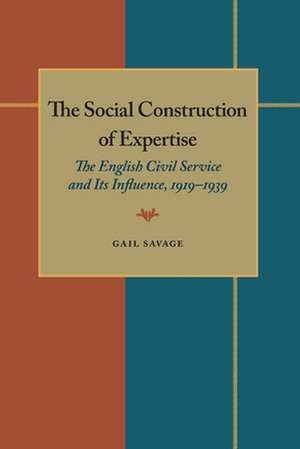The Social Construction of Expertise: The English Civil Service and Its Influence, 1919–1939
Autor Gail Savageen Limba Engleză Paperback – 15 mar 1996
The British created a system wherein the social identity of civil servants clearly influenced their position on official matters. This privileged class set the tone for major policy decisions affecting all members of society. Savage addresses this social construction of power by analyzing the social origins and career patterns of higher-level civil servants as a backdrop for investigating the way four different social service ministries formulated policies between the two World Wars: the Board of Education, the Ministry of Agriculture, the Ministry of Labour, and the Ministry of Health.
Preț: 182.43 lei
Nou
Puncte Express: 274
Preț estimativ în valută:
34.91€ • 36.54$ • 29.05£
34.91€ • 36.54$ • 29.05£
Carte indisponibilă temporar
Doresc să fiu notificat când acest titlu va fi disponibil:
Se trimite...
Preluare comenzi: 021 569.72.76
Specificații
ISBN-13: 9780822955962
ISBN-10: 0822955962
Pagini: 248
Dimensiuni: 152 x 229 x 18 mm
Greutate: 0.42 kg
Ediția:1
Editura: University of Pittsburgh Press
Colecția University of Pittsburgh Press
ISBN-10: 0822955962
Pagini: 248
Dimensiuni: 152 x 229 x 18 mm
Greutate: 0.42 kg
Ediția:1
Editura: University of Pittsburgh Press
Colecția University of Pittsburgh Press
Recenzii
“Gail Savage’s book is a splendid example of the best kind of Ph.D. thesis that, while confirming traditional interpretations, demonstrates the subtle differences between a supposedly monolithic governing elite and how its class and educational background operated unconsciously to perpetuate the existing social order.”
---Albion
---Albion
“This is the most impressive piece of work, one which combines solid scholarship and a distinctive viewpoint.”
—James B. Christoph, Indiana University
—James B. Christoph, Indiana University
Notă biografică
Gail Savage is professor of history at St. Mary’s College of Maryland.
Descriere
A study of the the British Civil Service between world wars as a socially priviledged system wherein members influenced major policy decisons at four primary social service ministries.
